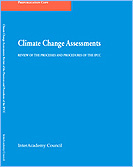Climate change is a long-term challenge that will require every nation to make decisions about how to respond. The Intergovernmental Panel on Climate Change (IPCC) was established by the World Meteorological Organization and the United Nations Environment Programme to help inform such decisions by producing comprehensive assessments of what is known about the physical climate system, its global and regional impacts, and options for adaptation and mitigation. Sitting at the interface between science and politics, the IPCC assessment process has sustained a working dialog between the world’s governments and scientists since its inception in 1988.
Representatives of 194 participating governments agree on the scope of the assessment, elect the scientific leaders of the assessment, nominate authors, review the results, and approve the summaries written for policy makers. More than a thousand volunteer scientists evaluate the available scientific, technological, and socioeconomic information on climate change, and draft and review the assessment reports. The thousands of scientists and government representatives who work on behalf of the IPCC in this non-traditional partnership are the major strength of the organization.

